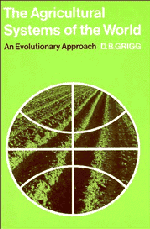Book contents
- Frontmatter
- Contents
- Acknowledgements
- 1 Introduction
- PART ONE
- PART TWO
- 5 Shifting agriculture
- 6 Wet-rice cultivation in Asia
- 7 Pastoral nomadism
- 8 Mediterranean agriculture
- 9 Mixed farming in western Europe and North America
- 10 Dairying
- 11 Plantations
- 12 Ranching
- 13 Large-scale grain production
- 14 Conclusions
- Appendix: Regions of plant domestication
- Notes
- Bibliography
- Index
- Frontmatter
- Contents
- Acknowledgements
- 1 Introduction
- PART ONE
- PART TWO
- 5 Shifting agriculture
- 6 Wet-rice cultivation in Asia
- 7 Pastoral nomadism
- 8 Mediterranean agriculture
- 9 Mixed farming in western Europe and North America
- 10 Dairying
- 11 Plantations
- 12 Ranching
- 13 Large-scale grain production
- 14 Conclusions
- Appendix: Regions of plant domestication
- Notes
- Bibliography
- Index
Summary
We have seen in the preceding chapter how farmers in Europe and North America progressively shifted their attention to livestock products after 1850; of these, milk and other dairy products became by far the most important. In the European Economic Community, in the United States and in the United Kingdom, milk makes up one-fifth of the value of the total agricultural output and in some countries the proportion is even higher; in Finland it is 60 per cent, in Switzerland 36 per cent, and in Luxemburg 35 per cent. Although dairying has a long history, the modern dairy industry is a product of the last hundred years, and perhaps, more than any other branch of agriculture, has been dependent upon the growth of urban incomes, improvements in transport, and advances in science and technology.
Table 33 shows how closely dairy production is associated with areas of European settlement.
Five-sixths of the world's milk is produced in Europe, Russia, North America and Australasia, nearly nine-tenths of the butter, over four-fifths of the cheese, and virtually all the condensed, evaporated and dried milk. Further, much of the dairy production of Afro-Asia and Latin America is produced in outliers of European settlement such as South Africa and Argentina.
Until the 1850s dairying took place only on the farm. Fresh milk was only consumed by the farm family or in villages and towns within a close distance. Cheese and butter were made by the farmer or, more commonly, his wife. In some very large towns urban dairymen kept cows in stalls, fed upon hay and brewer's grains.
- Type
- Chapter
- Information
- The Agricultural Systems of the WorldAn Evolutionary Approach, pp. 187 - 209Publisher: Cambridge University PressPrint publication year: 1974

